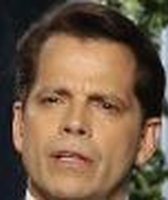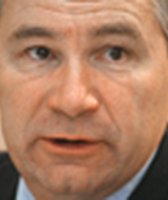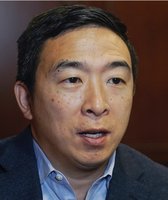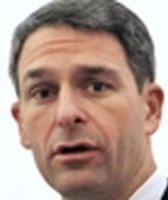Stand up for the facts!
Our only agenda is to publish the truth so you can be an informed participant in democracy.
We need your help.
I would like to contribute
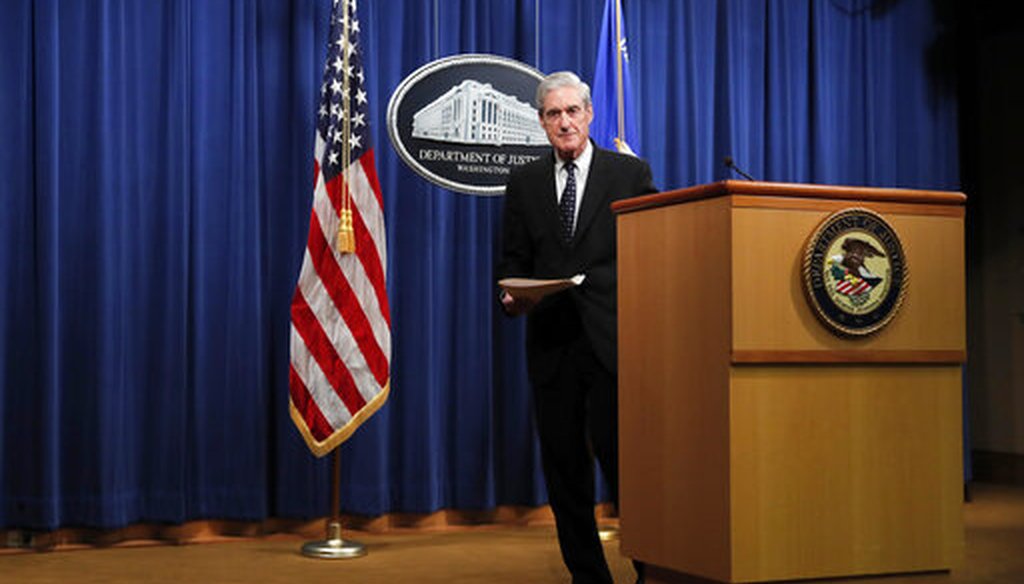
Special counsel Robert Muller walks from the podium after speaking at the Department of Justice, May 29, 2019, about the Russia investigation. (AP/Carolyn Kaster)
(Last updated July 24, 2019.)
U.S. law enforcement agencies and Congress are investigating links between Donald Trump’s presidential campaign and Russia, as part of a broader probe into Moscow’s interference in the 2016 election.
To date, Special Counsel Robert Mueller’s investigation has resulted in five former Trump aides agreeing to work with Mueller’s team under plea deals. Numerous Trump associates had contacts with Russian government officials or business people during the campaign and presidential transition.
As the investigation has unfolded, the Trump team’s stories have changed, recollections have been refreshed and government officials have come forward with new assessments of the intelligence.
This timeline documents everything we know thus far about the investigation into the Trump campaign and Russia. The sources are either verified events, court filings, public statements, or on-the-record media reports.
Sign up for PolitiFact texts
Have feedback or questions? Email us.
Spring 2014: A Kremlin-linked company that engages in influence operations, known as the Internet Research Agency, devised a strategy to interfere with the 2016 U.S. presidential election. Its goal was to spread distrust toward candidates and the American political system.
June 16, 2015: Donald Trump announced candidacy for president.
July 2015: Hackers supported by the Russian government penetrated the Democratic National Committee’s network, stealing large volumes of data and maintaining access for about a year.
Mid 2015: Thousands of Kremlin-backed social media accounts began to spread propaganda and disinformation, establishing a clear preference for Trump.
Oct. 28, 2015: Trump signed a letter of intent to negotiate the construction of a Trump Tower in Russia, as first reported by CNN.
January 2016: Michael Cohen, Trump’s longtime lawyer, emailed Russian President Vladimir Putin’s press secretary Dmitry Peskov about plans to build a Trump Tower in Moscow. Later, Cohen would falsely testify to Congress that the deal ended this month. In fact, discussions about the project lasted as late as June 2016.
March 19, 2016: The chairman of Hillary Clinton’s presidential campaign, John Podesta, fell victim to an email phishing scam. It is believed this is how a group of Russian hackers gained access to his email account.
Early March 2016: George Papadopoulos joined the Trump campaign as an adviser. While traveling in Italy in mid March, Papadopoulos met a London-based professor whom Papadopoulos understood to have "substantial connections to Russian government officials."
March 21, 2016: Trump named Papadopoulos and Carter Page as members of his foreign policy team, in an interview with the Washington Post.
March 24, 2016: Papadopoulos met in London with the professor who introduced him to a female Russian national who Papadopoulos believed to be a relative of Putin with links to other senior Russian officials.
March 29, 2016: Trump tapped Paul Manafort to manage the Republican National Convention.
March 31, 2016: Papadopoulos told Trump, Jeff Sessions and other campaign members that he can use his Russian connections to arrange a meeting between Trump and Putin.
April 2016: Papadopoulos’ professor source told the Trump adviser about a meeting with high-ranking Russian government officials in Moscow who have "dirt" on Hillary Clinton in the form of "thousands of emails."
April 2016: Russian Ambassador Sergey Kislyak attended Trump’s foreign policy speech in Washington, where he met Trump’s son-in-law and campaign adviser Jared Kushner.
May 2016: Donald Trump, Jr. met with Alexander Torshin at National Rifle Association convention in Louisville. Torshin is a former senator and deputy head of Russia's central bank.
Mid 2016: The Kremlin-linked Internet Research Agency established a strategy of supporting Donald Trump’s candidacy and disparaging Hillary Clinton.
June 3, 2016: Trump, Jr. received an email from Rob Goldstone, a business associate. Goldstone told the younger Trump that Moscow supported his father’s candidacy, and said he has a connection to a Russian government official with incriminating evidence against Hillary Clinton.
Goldstone told Trump Jr.: "This is obviously very high level and sensitive information but is part of Russia and its government’s support for Mr. Trump."
The younger Trump replied that same day: "If it’s what you say I love it."
June 7, 2016: Trump announced he would soon make a "major speech" on Clinton.
June 8, 2016: Russian intelligence officers launched DC Leaks, a website used to release stolen emails.
June 9, 2016: Trump, Jr., Manafort and Kushner met with a Russian national and several others at Trump Tower, based on Goldstone’s promise to Trump Jr. that a "Russian government attorney" would deliver damaging information about Clinton. Several shifting accounts of the meeting were later offered.
June 14, 2016: The DNC announced, through cybersecurity firm CrowdStrike, that it had been hacked by Russian government actors.
June-July 2016: WikiLeaks and DCLeaks released thousands of documents about Clinton and internal DNC deliberations.
Early July 2016: Trump campaign adviser Carter Page traveled to Moscow, where he met with Russia’s deputy prime minister and a high-ranking Russian oil official. Page emailed campaign staffers that the deputy prime minister had "expressed strong support for Mr. Trump," and that he had gleaned "incredible insights and outreach" in Russia.
Mid July 2016: Trump campaign associate J.D. Gordon successfully lobbied for the GOP platform to be changed to benefit Russia. Language was inserted vowing not to provide lethal aid to Ukrainians in their fight against Russian-backed separatists.
July 18, 2016: Sessions talked with Kislyak after Sessions’ speech at the Republican National Convention.
July 20, 2016: Sessions talked with Kislyak after a speech. Separately, Trump campaign associates Page and Gordon met with Kislyak.
July 22, 2016: WikiLeaks began releasing DNC emails ahead of the Democratic National Convention. The first tranche — nearly 20,000 emails — revealed an embarrassing glimpse at internal DNC deliberations.
Late July 2016: A senior Trump campaign official was directed to contact Trump’s longtime friend and associate Roger Stone about any additional WikiLeaks releases, and what additional damaging information the group possessed on the Clinton campaign.
July 25, 2016: The FBI publicly confirmed its investigation into the DNC hack.
July 2016: The FBI opened a counterintelligence investigation into links between the Trump campaign and the Russian government. Republican members of the House Intelligence Committee later confirmed that information from Papadopoulos triggered the investigation.
July 27, 2016: During a press conference, Trump said of Clinton’s emails: "Russia, if you’re listening, I hope you can find the 33,000 emails that are missing. I think you will probably be rewarded mightily by our press."
July 27, 2016: Russians for the first time began to target Clinton’s emails.
August 27, 2016: Senate Minority Leader Harry Reid, D-Nev., sent a letter to FBI Director James Comey asking the bureau to investigate alleged Russian interference in the election. Reid also raised concerns about contacts Trump campaign members reportedly made with WikiLeaks and Russian nationals under U.S. sanction.
September 2016: Kushner received an email concerning WikiLeaks, which he then forwarded to another campaign official, according to the leaders of the Senate Judiciary Committee. (Read Kushner’s lawyer’s response.)
September 2016: Sessions met with Kislyak in his Senate office.
Oct. 7, 2016: The U.S. intelligence community released a statement saying the release of emails on DC Leaks and WikiLeaks "are consistent with the methods and motivations of Russian-directed efforts."
"The U.S. Intelligence Community is confident that the Russian Government directed the recent compromises of e-mails from U.S. persons and institutions, including from U.S. political organizations," the statement reads.
Oct. 7, 2016: An Access Hollywood tape was released in which Trump can be heard in a 2005 interview bragging about groping women.
Oct. 7, 2016: Less than an hour after the Access Hollywood surfaces, WikiLeaks published more than 2,000 emails of Clinton campaign chairman John Podesta. Between this date and the election, WikiLeaks released more than 50,000 documents stolen from Podesta’s personal email account.
Mid October 2016: Trump Jr. corresponded with WikiLeaks through Twitter’s private message service. WikiLeaks asked the younger Trump to direct his Twitter followers to its trove of documents. Fifteen minutes later, candidate Trump tweeted about WikiLeaks. Two days later, Trump Jr. tweeted a link to WikiLeaks’ archive.
Oct. 21, 2016: The FBI and Justice Department obtained a warrant to monitor Page based on probable cause that Page is Russian agent. Page stepped down from the Trump campaign the previous month.
Nov. 8, 2016: Trump was elected president.
Dec. 1, 2016: Kushner and campaign adviser Michael Flynn met with Kislyak at Trump Tower.
Dec. 13, 2016: Kushner met with Russian banker Sergey Gorkov, the CEO of a state-run Russian bank under U.S. sanction. Gorkov was described to Kushner as "someone with a direct line to the Russian president who could give insight into how Putin was viewing the new administration and best ways to work together."
Dec. 29, 2016: In the waning days of his presidency, Barack Obama responded to Russia’s interference in the election by expelling 35 Russian diplomats and issuing new sanctions.
Late December 2016: Following Obama’s move against Russia, Flynn asked Kislyak to "refrain from escalating the situation." Kislyak later told Flynn that Russia "had chosen to moderate its response to those sanctions as a result of his request."
Dec. 30, 2016: Putin declined to retaliate against the Obama administration’s sanctions.
Later that day, Trump praised Putin’s decision over Twitter:
Jan. 6, 2017: The U.S. intelligence community concluded with "high confidence" that Russia engaged in an influence campaign directed at the election.
Jan. 10, 2017: In his confirmation hearing to become Trump’s attorney general, Sessions said under oath that he did not have contact with Russian officials during the 2016 presidential campaign. In a separate questionnaire submitted a week later, Sessions denied contacting any Russian officials regarding the 2016 election.
Jan. 10, 2017: A dossier compiled by former British intelligence officer Christopher Steele became public. Steele wrote the dossier on behalf of Fusion GPS, a research firm whose work had been funded in part by the Democratic National Committee and Hillary Clinton’s presidential campaign. The document suggested the Kremlin possesses compromising material against Trump and raises the possibility Trump is vulnerable to blackmail.
Jan. 20, 2017: Trump was inaugurated as president.
Late January 2017: Flynn, now Trump’s national security adviser, lied to the FBI, falsely claiming that he never discussed the Obama administration’s Russia sanctions with Kislyak.
Jan. 27, 2017: During a meeting with FBI Director James Comey, Trump said, "I need loyalty, I expect loyalty," according to sworn testimony Comey would later deliver to Congress. Trump has denied this.
Feb. 13, 2017: Flynn resigned after 24 days as national security adviser.
Feb. 14, 2017: Trump asked Comey to drop the investigation into Flynn, according to Comey's sworn testimony. Comey said Trump told him: "I hope you can see your way clear to letting this go, to letting Flynn go. He is a good guy. I hope you can let this go." Trump has denied this.
March 1, 2017: The Washington Post reported that Sessions met with Kislyak twice over the previous year, encounters that Sessions failed to disclose during his confirmation proceedings. Sessions later confirmed these meetings.
March 2, 2017: Sessions recused himself from any "existing or future investigations" related to the 2016 presidential election.
March 20, 2017: Comey publicly confirmed the FBI’s counterintelligence probe includes "investigating the nature of any links between individuals associated with the Trump campaign and the Russian government and whether there was any coordination between the campaign and Russia's efforts."
May 9, 2017: Trump fired FBI Director James Comey.
May 11, 2017: Trump told NBC "this Russia thing" factored into his decision to fire Comey.
May 17, 2017: The Justice Department appointed former FBI Director Robert Mueller as special counsel. Mueller led the investigation into possible ties or coordination between the Trump campaign and Russian officials, as well as other matters that "may arise directly from the investigation."
July 8, 2017: The New York Times reported on the June 9, 2016, meeting at Trump Tower where Trump, Jr., Manafort and Kushner met with a Kremlin-linked Russian lawyer. That story prompted Trump Jr. to issue the following statement to the media:
"It was a short introductory meeting. I asked Jared (Kushner) and Paul (Manafort) to stop by. We primarily discussed a program about the adoption of Russian children that was active and popular with American families years ago and was since ended by the Russian government, but it was not a campaign issue at the time and there was no follow up.
"I was asked to attend the meeting by an acquaintance, but was not told the name of the person I would be meeting with beforehand."
July 9, 2017: The New York Times reported that Trump Jr. arranged the June 9, 2016, Trump Tower meeting after being promised he would receive damaging information about Clinton. For the second consecutive day, Trump Jr. issued a statement to the media about the meeting. (Read a full account of the Trump team’s shifting explanations.)
July 14, 2017: One of the attendees of the Trump Tower meeting, Russian-American Rinat Akhmetshin, a former Soviet soldier with experience in military counterintelligence, said that after the meeting, Russian lawyer Natalia Veselnitskaya left behind documents for the Trump campaign. According to an interview with the Associated Press, Akhmetshin said Veselnitskaya believed the documents detailed "the flow of illicit funds to the Democrats," and she suggested to the campaign that publishing them could help Trump's electoral chances.
Aug. 1, 2017: White House Press Secretary Sarah Huckabee Sanders was asked about a news report that the president had tried to change the narrative around Trump Jr.'s meeting with the Russian lawyer. Sanders said Trump "weighed in" on his son’s statement about the June 9 Trump Tower meeting. Sanders’ statement is inconsistent with previous explanations offered by Trump’s team.
Aug. 2, 2017: Trump signed a law imposing new Russia sanctions in response to Moscow’s interference with the election. Congress largely passed the bill — with veto-proof majorities — in response to Trump’s downplaying of the meddling question and his seeming interest in lifting sanctions against Russia, experts said.
Oct. 5, 2017: Papadopoulos pled guilty to lying to the FBI about his efforts to put the Trump campaign in contact with Moscow. He entered a plea agreement with Mueller.
Oct. 30, 2017: Manafort and Trump campaign associate Rick Gates surrendered to the FBI after being charged with a dozen felonies each, including failing to disclose lobbying activities on behalf of foreign entities, financial crimes and making false statements. They pled not guilty to all charges.
Nov. 2, 2017: Page told the House Intelligence Committee he had notified Sessions about contacts he made with Kremlin officials during his July 2016 Russia. This contradicted Sessions’ previous denials.
Nov. 16, 2017: The top Republican and Democrat on the Senate Judiciary Committee sent a letter to Kushner’s attorney saying Kushner failed to turn over several documents to the committee.
Nov. 30, 2017: Flynn pled guilty to lying to the FBI about his discussions with the Russian ambassador during the presidential transition, and entered a plea agreement with Mueller.
Feb. 16, 2018: The special counsel charges 13 Russians and three Russian entities with conspiring to defraud the United States and interfere with the 2016 presidential election.
The Russian government denied involvement.
The special counsel also charged Richard Pinedo with identity fraud. He would later plead guilty.
Feb. 18, 2018: Dutch attorney Alex Van Der Zwaan was indicted for lying to the FBI about interactions with Rick Gates and another associate of Manafort. He would later plead guilty and serve a 30-day sentence before being deported to the Netherlands.
Feb. 22, 2018: A new indictment was filed against Manafort and Gates containing 32 charges, including tax and bank fraud.
Feb. 23, 2018: Gates pled guilty and agreed to work with Mueller’s probe.
Feb. 24, 2018: A new indictment was filed against Manafort alleging he "secretly retained a group of former senior European politicians to take positions favorable to Ukraine, including by lobbying in the United States."
April 9, 2018: The FBI raided the offices of Trump’s longtime lawyer and aide Michael Cohen. The case was referred to the U.S. Attorney’s office in the Southern District of New York.
April 19, 2018: Memos were released of former FBI Director James Comey, providing his contemporaneous written impressions of several one-on-one discussions with Trump.
April 27, 2018: Republican members of the House Intelligence Committee released a final report on the committee’s Russia investigation over Democratic objections. The committee's Republican members found no evidence of collusion between the Trump campaign and Moscow, but concluded that Russia conducted cyberattacks on U.S. political institutions during the 2016 campaign.
The committee’s top Democrat, Adam Schiff of California, criticized GOP members for closing the investigation prematurely, and called their findings superficial and politically motivated. Statements made by Cohen about Trump Tower Moscow, which Cohen later admitted were lies, go largely unchallenged in the report.
May 1, 2018: Trump reacted angrily to a New York Times report containing a list of questions Mueller is said to have sent Trump as part of the special counsel investigation, calling it a "witch hunt."
June 8, 2018: Mueller added an obstruction charge against Manafort and indicted his business partner Konstantin Kilimnik.
July 3, 2018: A Senate panel that independently reviewed the intelligence community’s assessment backed up its findings, concluding that the agencies’ joint assessment was a "sound intelligence product."
July 13, 2018: The special counsel indicted 12 Russian intelligence officers for their role in the hacking of the Democratic National Committee, the Democratic Congressional Campaign Committee and the Clinton campaign, and leaking of emails and documents.
The indictment made reference to an unnamed U.S. person who "was in regular contact with senior members of the presidential campaign of Donald J. Trump," and who communicated during the election with Guccifer 2.0, a front for Russian operatives. Former Trump campaign adviser Stone acknowledged he is "probably" the U.S. person referenced in the indictment.
July 16, 2018: In a joint press conference with Russian President Vladimir Putin, Trump appeared to accept Putin’s denial of Russian election interference. (The following day Trump claimed he misspoke.)
July 21, 2018: In response to a Freedom of Information Act request, the Justice Department released a heavily-redacted version of the warrant application used to obtain a wiretap on former Trump campaign adviser Carter Page starting in October 2016, a month after he parted ways with Trump’s team.
July 27, 2018: Trump denied a CNN report that he knew in advance about the June 9, 2016, Trump Tower meeting. The report was based on unnamed sources who said former Trump attorney Cohen is willing to confirm Trump's foreknowledge of the meeting to the special counsel. In repsonse, Trump tweeted, "I did NOT know of the meeting with my son, Don jr. Sounds to me like someone is trying to make up stories in order to get himself out of an unrelated jam (Taxi cabs maybe?)," an apparent reference to Cohen's role managing taxi companies.
Aug. 1, 2018: Trump called on his attorney general to end the Mueller probe, tweeting: "This is a terrible situation and Attorney General Jeff Sessions should stop this Rigged Witch Hunt right now, before it continues to stain our country any further."
Aug. 5, 2018: Trump tweeted about the June, 9, 2016, meeting at Trump Tower, saying it was "a meeting to get information on an opponent," adding to the series of shifting explanations of the meeting arranged by Donald Trump Jr.
Fake News reporting, a complete fabrication, that I am concerned about the meeting my wonderful son, Donald, had in Trump Tower. This was a meeting to get information on an opponent, totally legal and done all the time in politics - and it went nowhere. I did not know about it!
— Donald J. Trump (@realDonaldTrump) August 5, 2018
Aug. 21, 2018: Manafort was convicted of eight of 18 felony counts. A jury found Manafort guilty on five tax fraud charges, one charge of hiding foreign bank accounts and two counts bank fraud. A mistrial was declared for the other 10 charges.
Aug. 21, 2018: Cohen pled guilty in federal court to a series of criminal charges, including a campaign finance law violation that implicated the president. His other convictions concern tax fraud and bank fraud.
Sept. 7, 2018: Papadopoulos was sentenced to 14 days in jail and a year of supervised release after pleading guilty to lying to the FBI.
Sept. 14, 2018: Manafort pled guilty to reduced charges in exchange for an open-ended cooperation agreement that obligates him to "cooperate fully, truthfully, completely, and forthrightly" with the special counsel’s investigation, and possibly other prosecutors.
Oct. 19, 2018: The Justice Department accused Russians with ties to Putin of operating an "information warfare" targeting the U.S. midterm elections.
Nov. 20, 2018: Trump submitted written answers to Mueller’s questions.
Nov. 26, 2018: Papadopoulos reported to prison to serve a two-week sentence.
Nov. 26, 2018: Mueller’s team accused Manafort of breaching his plea agreement, saying he repeatedly lied to federal investigators. The special counsel's office argued in a court filing that "crimes and lies" Manafort committed after the plea deal relieve Mueller’s team from honoring their end of the bargain. Manafort denied the charges.
Nov. 26, 2018: Pundit and conspiracy theorist Jerome Corsi rejected a plea offer from the special counsel. A draft of the plea deal alleges Corsi gave Stone advance notice in August 2016 that WikiLeaks would release damage information on Hillary Clinton. A subsequent indictment of Stone reiterated many of the same allegations.
Nov. 27, 2018: Manafort denied ever meeting with Julian Assange, following a report in The Guardian claiming Trump’s onetime campaign manager held secret talks with the WikiLeaks editor at the Ecuadorian Embassy in London.
"I have never met Julian Assange or anyone connected to him," Manafort said in a statement. "I have never been contacted by anyone connected to Wikileaks, either directly or indirectly. I have never reached out to Assange or Wikileaks on any matter."
Nov. 29, 2018: Cohen pled guilty to to lying to Congress about the Russian-based development proposal Trump Tower Moscow. Cohen admitted he lied when he told lawmakers he had only briefed Trump on the project three times, and that negotiations broke down in January 2016. In fact, talks continued as late as June 2016, after Trump became the Republican Party’s presumptive nominee.
Cohen also concealed his communications with Kremlin officials, as well as the fact he asked Trump to travel to Moscow to further the deal. He said his lies were intended to harmonize with the Trump campaign’s "political messaging."
Nov. 29, 2018: Cohen’s Russian business associate, Felix Sater, said he and Cohen were interested in offering a $50 million penthouse in Trump Tower Moscow to Putin because they believed "it would entice other wealthy buyers to purchase their own."
Rep. Adam Schiff of California, the top Democrat on the House Intelligence Committee said Sater’s comment, if true, shows House investigations should continue to probe "what, if any, financial leverage the Russians may hold over President Trump and the Trump Organization."
Schiff, who is expected to lead the committee when the Democrats take control of the House in January 2019, said the panel intends to call Cohen back to testify again, as do Senate Democrats. The House committee’s Democratic members also plan to send the special counsel all unredacted transcripts of interviews the panel conducted as part of its Russia investigation.
Nov. 30, 2018: Trump responded via Twitter to defend his pursuit of Trump Tower Moscow, describing his business as "very legal and very cool."
"Oh, I get it! I am a very good developer, happily living my life, when I see our Country going in the wrong direction (to put it mildly). Against all odds, I decide to run for President & continue to run my business-very legal & very cool, talked about it on the campaign trail … Lightly looked at doing a building somewhere in Russia. Put up zero money, zero guarantees and didn’t do the project. Witch Hunt!"
Nov. 30, 2018: The special counsel’s office said it may retry Manafort on previous charges that led to hung jury.
Nov. 30, 2018: Lawyers for Cohen requested that he be spared prison, citing Cohen’s cooperation with federal investigations, including the special counsel probe.
Dec. 7, 2018: The special counsel’s office accused Manafort of lying multiple times to investigators, in breach of his federal plea deal.
Dec. 12, 2018: Cohen was sentenced to three years in prison for financial crimes as well as for lying to Congress. He was also ordered to pay $2 million in penalties.
Before the sentence was handed down, Cohen told the courtroom, "It was my own weakness and a blind loyalty to this man (Trump) that led me to choose a path of darkness over light. Time and time again I felt it was my duty to cover up his dirty deeds."
Dec. 13, 2018: Maria Butina, a Russian living in the United States, pled guilty to conspiring to act as an illegal foreign agent. Butina has been accused of trying to infiltrate Republican power circles.
Jan. 8, 2019: Manafort’s lawyers submitted a court filing denying that Manafort breached his plea deal, as the special counsel’s office alleged. The filing inadvertently revealed that Manafort shared 2016 election polling data with his business partner Kilimnik, whom Mueller had previously charged with of obstruction of justice.
Jan. 18, 2019: The special counsel denied a BuzzFeed News report which claimed that Trump directed Cohen to lie to Congress about the Trump Tower Moscow project. In a rare public comment, a spokesman for Mueller said, "BuzzFeed’s description of specific statements to the special counsel’s office, and characterization of documents and testimony obtained by this office, regarding Michael Cohen’s congressional testimony are not accurate."
Jan. 23, 2019: Cohen, in a statement from his lawyer, announced he would not voluntarily testify before the House Oversight Committee in coming weeks, as he had planned. Cohen cited "ongoing threats against his family from President Trump and Mr. (Rudolph) Giuliani" as among the reasons for the reversal. The following day, the Senate Intelligence Committee subpoenaed him; he is slated to testify Feb. 12.
Jan. 24, 2019: The FBI arrested Trump's longtime friend and associate Stone. He was charged with seven felonies, including lying to Congress under oath, witness tampering and obstruction. The indictment lays out a pattern of behavior that gives the strong impression Stone tried to conceal his contacts with WikiLeaks.
Jan. 27, 2019: The Trump administration lifted sanctions on three companies connected to Russian oligarch Oleg Deripaska, over objections from Democratic lawmakers, who were joined by some Republicans. Experts said sanctions relief wasn’t a demonstration of Trump’s coziness with Russian oligarchs, so much as it was his administration’s way of ending the disruption it inflicted on the global metals market when it sanctioned Deripaska’s aluminum company Rusal. (Read our full report.)
March 22, 2019: Mueller concluded his investigation into Russian interference in the 2016 election and related matters. Mueller submitted a confidential report to Attorney General William Barr explaining his "prosecution and declination decisions." Barr told lawmakers who lead congressional judiciary committees in a letter that he would advise them the special counsel's principal conclusions, perhaps as soon as this weekend.
White House press secretary Sarah Sanders said the White House had not received or been briefed on the report. She added that Barr would determine the next steps, adding, "We look forward to the process taking its course."
April 18, 2019: Barr released a redacted version of the special counsel's report spanning about 400 pages. It reaffirmed that Russia favored Trump over Hillary Clinton in the 2016 presidential election, and that the Trump campaign believed it would benefit from Russia’s interference. However, the investigation did not establish coordination or a conspiracy between the Trump campaign and Russia.
The report also outlined "key issues and events" examined as part of the investigation on whether Trump obstructed justice. Mueller did not make a determination on that matter. "The evidence we obtained about the president's actions and intent presents difficult issues that prevent us from conclusively determining that no criminal conduct occurred," Mueller said. "Accordingly, while this report does not conclude that the President committed a crime, it also does not exonerate him."
(Read more about our key takeaways from the report.)
May 29, 2019: Mueller brought the investigation to a formal close in his first public statement about the Russia probe. Mueller recapped Russia’s attempts to interfere in the 2016 presidential election and explained why he could not have brought charges against the president even if he found they were substantiated.
Under long-standing department policy, Mueller said, a president cannot be charged with a federal crime while in office. "That is unconstitutional," Mueller said, adding that even if the charge is kept under seal and hidden from the public, "that, too, is prohibited."
Mueller’s last words emphasized the overarching findings of the nearly two-year probe.
"I will close by reiterating the essential allegation of our indictments, that there were multiple, systematic efforts to interfere in our election," Mueller said. "That allegation deserves the attention of every American."
July 24, 2019: Mueller testified before two House committees, limiting himself to findings published in the special counsel's report. He concluded his opening statement by saying, "Over the course of my career, I’ve seen a number of challenges to our democracy. The Russian government’s effort to interfere in our election is among the most serious. As I said on May 29, this deserves the attention of every American."
Our Sources
U.S. intelligence community, "Assessing Russian Activities and Intentions in Recent US Elections," Jan. 6, 2017
Washington Post, "Russian government hackers penetrated DNC, stole opposition research on Trump," June 14, 2016
Wall Street Journal, "Russian Twitter Support for Trump Began Right After He Started Campaign," Nov. 6, 2017
Statement of Michael Cohen, Aug. 28, 2017
CBS News, "The phishing email that hacked the account of John Podesta," Oct. 28, 2016
Vice, "How Hackers Broke Into John Podesta and Colin Powell’s Gmail Accounts," Oct. 20, 2016
Statement of the Offense, U.S. v. George Papadopoulos
PolitiFact, "Sean Spicer’s False claim that Paul Manafort played a minor role in the Trump campaign," March 22, 2017
NBC, "Kushner failed to disclose outreach from Putin ally to Trump campaign," Nov. 18, 2018
Statement by Jared Kushner, July 24, 2017
Office of the Director of National Intelligence, Joint Statement from the Department of Homeland Security and Office of the Director of National Intelligence on Election Security, Oct. 7, 2016
PolitiFact, "It's True: WikiLeaks dumped Podesta emails hour after Trump video surfaced," Dec. 18th, 2016
Tweet by Donald Trump Jr., July 11, 2017
ABC News, "Emails Released by WikiLeaks Appear to Show DNC Trying to Aid Hillary Clinton," July 22, 2016
PolitiFact, "What you need to know about newly revealed Trump campaign-Russia ties," Nov. 9, 2017
Jeff Sessions letter to Senate Judiciary Committee, March 6, 2017
Politico, "FBI probing DNC hack," July 25, 2016
Republican House Intelligence Committee memo, Feb. 2, 2018
Donald Trump press conference, YouTube, July 27, 201
Letter to Jared Kushner’s attorney from Senate Judiciary Committee leadership, Nov. 16, 2017
New York Times, "Top Russian Official Tried to Broker ‘Backdoor’ Meeting Between Trump and Putin," Nov. 17, 2017
Letter from Jared Kushner’s attorney Abbe Lowell to Senate Judiciary Committee leadership, Nov. 16, 2017
New York Times, "Obama Strikes Back at Russia for Election Hacking," Dec. 29, 2016
PolitiFact, "In Context: What Jeff Sessions told Al Franken about meeting Russian officials," March 2, 2017
BuzzFeed, text of the Steele Dossier, Jan. 10, 2017
Remarks by President Donald Trump, June 9, 2017
Washington Post, "Michael Flynn resigns as national security adviser," Feb. 14, 2017
PolitiFact, "Read James Comey's opening remarks for the June 8 Senate hearing," June 7, 2017
Tweet by Donald Trump, Dec. 3, 2017
Washington Post, "Sessions met with Russian envoy twice last year, encounters he later did not disclose," March 1, 2017
Attorney General Jeff Sessions statement on recusal, March 2, 2017
Politico, "Sessions under fire over Russia meetings," March 2, 2017
USA Today, "Two other Trump advisers also spoke with Russian envoy during GOP convention," March 2, 2017
CNN, "More Trump advisers disclose meetings with Russia's ambassador," March 4, 2017
House Intelligence Committee hearing on Russian interference in the 2016 U.S. election, March 20, 2017
Letter from President Donald Trump firing FBI Director James Comey, May 9, 2017
NBC News, "President Trump: This Russia Thing is a Made Up Story," May 11, 2017
Deputy Attorney General Rod Rosenstein letter appointing special counsel, May 17, 2017
New York Times, "Trump Team Met With Lawyer Linked to Kremlin During Campaign," July 8, 2017
New York Times, "Trump’s Son Met With Russian Lawyer After Being Promised Damaging Information on Clinton," July 9, 2017
Fox News, "Full statement by Donald Trump Jr. on Sunday's New York Times report," July 9, 2017
Washington Post, "Trump dictated son’s misleading statement on meeting with Russian lawyer," July 31, 2017
White House press briefing, Aug. 1, 2017
PolitiFact, "3 times Trump team changed its story on Russia," Aug. 3, 2017
Lawfare, George Papadopoulos stipulation and plea agreement, Oct. 30, 2017
PolitiFact, "What you need to know about Manafort indictment, Papadopoulos guilty plea," Oct. 30, 2017
New York Times, "Former Trump Aides Charged as Prosecutors Reveal New Campaign Ties With Russia," Oct. 30, 2017
Washington Examiner, "Carter Page: Telling Jeff Sessions of Russia trip 'was as irrelevant then as it is now,' " Nov. 2, 2017
PolitiFact, "House presses Jeff Sessions on Trump campaign's Russia ties, Clinton special counsel," Nov. 14, 2017
United States v. Michael Flynn, Dec. 1, 2017
PolitiFact, "Fight erupts over GOP intel memo’s accuracy," Feb. 2, 2018
Wall Street Journal, "Inside the FBI Life of Peter Strzok and Lisa Page, as Told in Their Text Messages," Feb. 2, 2018
Richard Pinedo plea agreement, Feb. 2, 2018
U.S. vs. Richard Pinedo, Feb. 2, 2018
Tweet by Donald Trump, Feb. 3, 2018
New York Times, "Trump Blocks Release of Memo Rebutting Republican Claims," Feb. 9, 2018
U.S. vs. Internet Research Agency, et. al., Feb. 16, 2018
Washington Post, "Russian troll farm, 13 suspects indicted in 2016 election interference," Feb. 16, 2018
New York Times, "13 Russians Indicted as Mueller Reveals Effort to Aid Trump Campaign," Feb. 16, 2018
CNN, "Kremlin dismisses Mueller's indictment of 13 Russians," Feb. 19, 2018
New York Times, "Yevgeny Prigozhin, Russian Oligarch Indicted by U.S., Is Known as ‘Putin’s Cook,’ " Feb. 16, 2018
Washington Post, "National security adviser sees proof of Russian hacking as ‘incontrovertible,’ prompting rebuke from Trump," Feb. 18, 2018
Washington Post, "Special counsel Mueller files new charges in Manafort, Gates case," Feb. 22, 2018
Washington Post, "Michael Cohen sentenced to three years in prison for crimes committed while working for Trump," Dec. 12, 2018
TVEyes, Video and transcript of Robert Mueller’s statement, May 29, 2019
PolitiFact, Read the redacted Mueller report, April 18, 2019; The Mueller report: What you need to know, April 18, 2019
Speaker.gov, Pelosi Statement on Special Counsel Mueller’s Press Statement Reiterating the President’s Obstruction, May 29, 2019
Twitter, @justinamash tweet, May 29, 2019; @SenSchumer tweet, May 29, 2019


 PolitiFact Rating:
PolitiFact Rating: 





